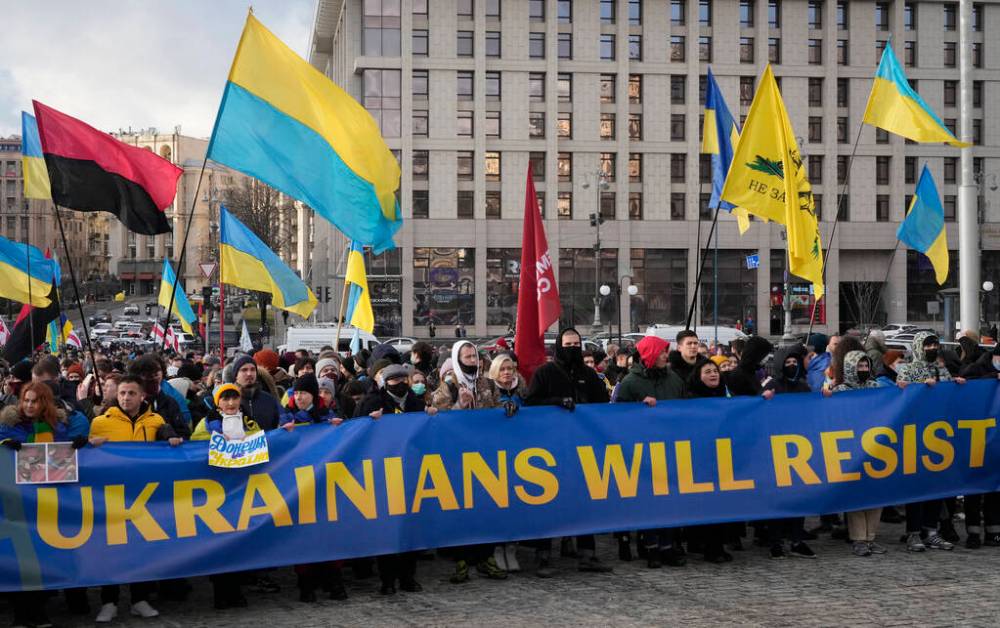Local Ukrainian community watches, waits as Russia tensions rise
Advertisement
Read this article for free:
or
Already have an account? Log in here »
To continue reading, please subscribe:
Monthly Digital Subscription
$0 for the first 4 weeks*
- Enjoy unlimited reading on winnipegfreepress.com
- Read the E-Edition, our digital replica newspaper
- Access News Break, our award-winning app
- Play interactive puzzles
*No charge for 4 weeks then price increases to the regular rate of $19.00 plus GST every four weeks. Offer available to new and qualified returning subscribers only. Cancel any time.
Monthly Digital Subscription
$4.75/week*
- Enjoy unlimited reading on winnipegfreepress.com
- Read the E-Edition, our digital replica newspaper
- Access News Break, our award-winning app
- Play interactive puzzles
*Billed as $19 plus GST every four weeks. Cancel any time.
To continue reading, please subscribe:
Add Free Press access to your Brandon Sun subscription for only an additional
$1 for the first 4 weeks*
*Your next subscription payment will increase by $1.00 and you will be charged $16.99 plus GST for four weeks. After four weeks, your payment will increase to $23.99 plus GST every four weeks.
Read unlimited articles for free today:
or
Already have an account? Log in here »
Hey there, time traveller!
This article was published 22/02/2022 (1390 days ago), so information in it may no longer be current.
The Ukrainian community in Manitoba has grown even more concerned over Russia’s escalating rhetoric and military actions against its neighbour, calling for swift action from the West.
On Monday, Russian President Vladimir Putin ordered troops to separatist regions of eastern Ukraine, shortly after Russia’s parliament recognized Donetsk and Luhansk in the Donbas region as independent “republics” — the latest in a series of escalations of the conflict between the two states.
On Tuesday, Foreign Affairs Minister Mélanie Joly said, via Twitter, Canada will move to impose economic sanctions on Russia.

President Joe Biden also announced the U.S. would order heavy financial sanctions against Russian banks and oligarchs, declaring Moscow had flagrantly violated international law. The 27 European Union members unanimously agreed Tuesday to levy their own initial set of sanctions.
Yulia Zmerzla is the executive director of the Oseredok Ukrainian Cultural and Educational Centre on Alexander Avenue. She, too, is worried over Russia’s aggression against Ukraine.
“It makes me, my family in Ukraine, plus other Ukrainians in Canada feel just terrible and we feel unsecure,” Zmerzla said. “I check the news every 10 minutes and there is no good news.”
She said she was glad to hear of increased sanctions placed against Russia, adding the eastern European nation also needs weapons for its defence.
Meantime, Zmerzla said, all Ukrainian-Canadians can do is raise funds and awareness, and continue to meet in churches and online to discuss the worsening situation.
Dmytro Malyk, second vice-president of the Ukrainian Canadian Congress Manitoba chapter, said he was appalled by an hour-long, televised speech Putin gave Monday.
“I think for many Ukrainians, in Ukraine and Ukrainian-Canadians, that was a major wake up call — Mr. Putin spent one hour trying to justify his plan and invasion of Ukraine’s territories by saying and persuading that Ukraine should not exist,” said Malyk, who immigrated to Canada in 2014.
“That was very concerning, and that’s an indication that Putin and Russia will not stop just with the recognition of the so-called states (in the Donbas).”

Malyk said he believes a full-scale invasion may occur. “That will mean a loss of life for Ukrainians.”
Without significant economic sanctions to “hurt Russia’s economy on Day 1” and weapons from the West, Ukraine may falter, he said.
“Ukraine will fight Russia regardless of whether the western governments are going to help or not. However, if Ukraine is left alone again without strong back up, without strong help, Ukraine will not win this.”
erik.pindera@freepress.mb.ca

Erik Pindera is a reporter for the Free Press, mostly focusing on crime and justice. The born-and-bred Winnipegger attended Red River College Polytechnic, wrote for the community newspaper in Kenora, Ont. and reported on television and radio in Winnipeg before joining the Free Press in 2020. Read more about Erik.
Every piece of reporting Erik produces is reviewed by an editing team before it is posted online or published in print — part of the Free Press‘s tradition, since 1872, of producing reliable independent journalism. Read more about Free Press’s history and mandate, and learn how our newsroom operates.
Our newsroom depends on a growing audience of readers to power our journalism. If you are not a paid reader, please consider becoming a subscriber.
Our newsroom depends on its audience of readers to power our journalism. Thank you for your support.
History
Updated on Tuesday, February 22, 2022 9:43 PM CST: Fixes typo in lede graph.


